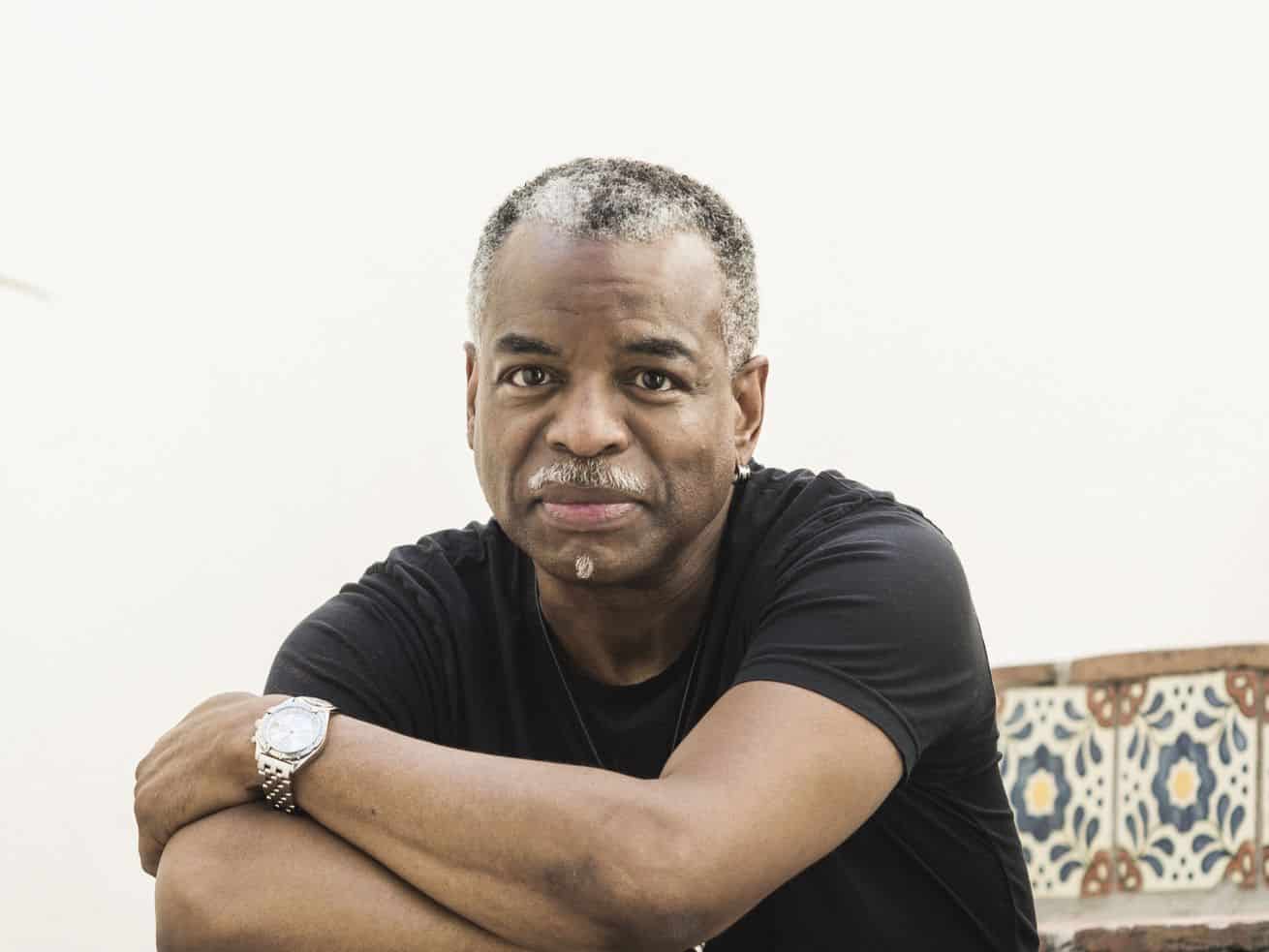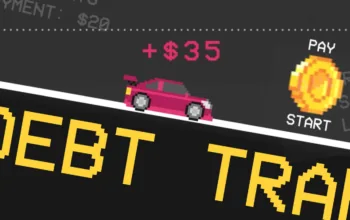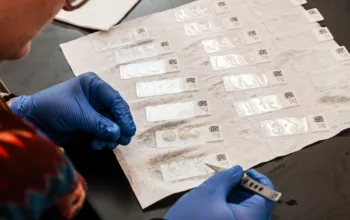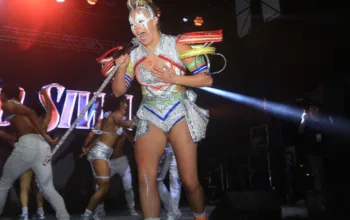LeVar Burton is America’s favorite teacher. He’s a natural fit for the long-running game show that Alex Trebek made a cultural institution.
Game shows aren’t exactly known for generating hugely anticipated “event television” viewing — but when LeVar Burton hosts Jeopardy! for five days beginning July 26, he may deliver the rare exception. That’s because Burton’s hosting stint is largely the result of a widespread social media campaign to land him the gig, and many people hope it will be a precursor to his full-time assumption of the role long filled by Alex Trebek.
Burton, who won an episode of Celebrity Jeopardy! in 1995, first expressed interest in hosting Jeopardy! at least a decade ago, long before Trebek’s May 2019 announcement that he had been diagnosed with aggressive pancreatic cancer. At the time, Burton seemed to merely be floating the idea that he might succeed Trebek someday, upon the host’s eventual retirement. In 2020, however, after social media chatter about Burton hosting surfaced a few months before Trebek’s death, Burton restarted the conversation.
Burton is one of a string of guest hosts who have carried the show this year. Beginning in January, public figures and popular Jeopardy! fan favorites, like all-time Jeopardy! champ Ken Jennings, have stepped in for weeklong hosting stints which also doubled as potential auditions for the permanent hosting gig. Despite having public and media support, it’s unclear whether Burton will ultimately get the job.
If Burton does wind up becoming Jeopardy!’s new host, his hiring won’t just fulfill his dream as a lifelong fan of the show. It will also be a mark of how fully internet culture can shape the culture at large.
Hosting Jeopardy! would play directly into Burton’s unique and remarkable onscreen career as well as his ongoing second life as a cultural icon. But beyond just offering us a chance to get reacquainted with a cool TV host, Burton’s Jeopardy! quest offers us a deeper understanding of how we think about celebrity, persona, and nostalgia.
LeVar Burton has had an extraordinary career
As a kid growing up in the shadow of the civil rights movement in the 1960s, LeVar Burton learned early on to value education as his best weapon for success. His mother, Erma Gene Christian, was a social worker and teacher who raised Burton and his sisters as a single mother in Sacramento, California. “She told me unequivocally,” Burton said in a 2014 interview. “You are going to grow up and you’re going to inherit a world that will probably be hostile to your presence simply because of the color of your skin, and the best thing you can do, the leveler of the playing field for you, is education.” Burton took that mantra to heart — but not before he made an amazing entrance into his professional acting career.
In 1977, at the age of 19, Burton was an undergraduate studying acting at the University of Southern California — a major change from previously studying for the Catholic priesthood. Burton was preparing for his first lead role ever (in the school production of Oklahoma!) when the drama department recommended him for his first professional audition, where he won the part of Kunta Kinte in the miniseries Roots.
#ROOTS was my first professional audition. I was a 19 year old Theater major, @USC when I played Kunta Kinte. pic.twitter.com/waXLFZd14L
— LeVar Burton (@levarburton) January 23, 2021
Based on writer Alex Haley’s novel Roots: The Saga of an American Family, the miniseries traced Haley’s own lineage through fictionalized, apocryphal narratives of what happened to his ancestors after they were abducted and sold into slavery in the US. The story followed several generations of Black characters who struggled to survive and maintain their family connections despite ongoing abuse and trauma.
Roots was a major TV landmark. Its eight episodes were viewed by more than 130 million Americans, setting viewership records that still stand today; it made the cover of Time magazine; it received a staggering 37 Emmy nominations, winning nine.
But if Roots was a historic moment for television, it wasn’t without controversy. In retrospect, it’s hard for many not to view the miniseries as a gratuitous display of abuse — a narrative of misery porn that psychologically wounded Burton while filming, and one we would roundly critique today; as critic Frank Rich wryly put it in 2013, “In a day when there were still only three networks to choose from in prime time and home video recording was a novelty, Americans rushed to their sets each night to see how slavery turned out.”
Nonetheless, Roots’ cultural impact was undeniable — and as the show’s main character, the original kidnapped slave who was brought to America from The Gambia, Burton’s Kunta Kinte made perhaps the most indelible impact of all.
Images of Kunta Kinte, bound in chains and an enormous slave collar but still defiant, or tied to a whipping post but refusing to call himself by the slave name given to him, still resonate. When Colin Kaepernick showed up for his widely publicized NFL tryout in 2019, after having been previously shut out of the league for kneeling during the national anthem as a protest against police brutality, he did so wearing a shirt emblazoned with Kunta Kinte’s name. The reference made an apt role model for a man who was refusing to accept the NFL’s ostracism. In Roots, after Kunta repeatedly tries and fails to escape, his captors cut off part of his foot, a scene Kendrick Lamar references in his 2015 hit “King Kunta”: “King Kunta — everybody wanna cut the legs off him / Kunta, Black man taking no loss.”
If Burton had never acted again, we would still be talking about him in 2021 — that’s how important Kunta Kinte was and is. But Burton would go on to hold two long-term roles that would make him even more of a fixture in households across the US: one as Geordi La Forge, the blind lieutenant commander of the starship Enterprise on Star Trek: The Next Generation, and one as the host of the PBS children’s series Reading Rainbow.
Burton has said that he got a call to audition for The Next Generation in 1986 because producer Bob Justman remembered how much Burton had loved the original Star Trek; the two had previously worked together and Burton had often talked about the series. Justman convinced Burton to consider The Next Generation by noting the involvement of Star Trek creator Gene Roddenberry in the new spinoff series. (Wesley Snipes also auditioned for the role of Geordi and later hailed Burton as “a greater actor” when Burton got the part instead.) “Gene Roddenberry’s vision was one that really meant a lot to me,” Burton later told NPR. “It said when the future comes, there’s a place for you. Seeing Nichelle Nichols [the Black actress who played Uhura in the original series] on the bridge of that ship meant that when the future got here, there was a place for people who looked like me.”
A blind engineer who was able to pilot the ship thanks to a vision-enhancing device, Geordi inspired legions of sci-fi fans, including fans with disabilities. Even more importantly, Geordi’s identity as a Black character who wasn’t primarily defined by his blackness was hugely important to Burton, who had declared repeatedly early on in his career that he didn’t want to be pigeonholed into playing stereotypes. “I have always said, as an actor, I want to not only recreate life specifically through the black experience, I want to be a human being in the roles that I play,” he told Congress in 1983, “and a black man could be a doctor or a lawyer in any given situation, and not always have to have come specifically from the ghetto.” It’s an idea that has become quite prominent over the last decade of cultural conversation, and Burton was among its pioneers. Burton went on to play Geordi through all seven seasons (1987–1994) of Star Trek: The Next Generation, as well as in four spinoff films.
Yet Burton’s most influential role was not as the pilot of the Enterprise, but his longtime gig as host of PBS’s Reading Rainbow, an immersive storytelling and education show for kids that premiered in 1983. Each week, Burton built a fun adventure and learning experience around a different children’s book — one week he’d go on a jungle safari, the next he’d don a snorkel and dive among the coral reefs.
During its original run from 1983 to 2006, Reading Rainbow was nominated for two primetime Emmys and won 26 daytime Emmys. Burton himself picked up 15 nominations and two wins as outstanding host of a children’s show. Even more significant was Reading Rainbow’s actual impact on education; a survey conducted by the Corporation for Public Broadcasting in 1997 found that teachers used Reading Rainbow in their classrooms more than any other PBS kids’ show.
Reading Rainbow ended in 2006 due to funding cuts. Across its 21 seasons, the series helped kids develop not only a deeper love of reading, but a better understanding of the world. Crucially, it also provided a powerful positive image of a young, well-educated Black man in an era when such depictions were rare — when criminologists and politicians were instead branding young Black men as “superpredators.”
That positive onscreen image was further strengthened by Burton’s engaging personality. Burton found his calling through Reading Rainbow; he now describes his life’s purpose to the New York Times as “bringing healing … joy … information, education, [and] enlightenment through storytelling.”
Meanwhile, the story the public has created about LeVar Burton is just as significant as the many stories he’s been telling us for decades.
Burton is part of a superfecta of wholesomeness that’s led the internet to canonize him as a pop culture saint
When the public considers the next Jeopardy! host, it’s easy to see a link between the public persona of Burton and that of Alex Trebek. They’re both purveyors of erudite wisdom, education, and general positivity. Burton’s role as Reading Rainbow’s host also situates him within a collective of PBS show hosts whose wholesome positive energy and sage curiosity are unblemished in the cultural consciousness. Alongside “happy little cloud” painter Bob Ross and kindly cardigan-wearing neighbor Fred Rogers, the gentle mentorship Burton delivered from afar to countless kids over the decades made him a trusted figure. All three men have become culturally revered and lavished with nostalgic veneration.
Speaking of Rogers to the New York Times, Burton noted that they both trained to enter the clergy, and both shared values of authenticity, service, and self-acceptance long before they became legendary PBS children’s show hosts. “He taught me that it was okay to use television as a ministry,” Burton later recalled to Mo Rocca. “[T]hat it was possible to enlighten while entertaining.”
Burton’s connection to Ross is less direct — Ross hosted the long-running PBS series Joy of Painting, which overlapped with much of Reading Rainbow’s run until Ross’s death from cancer in 1995 — but it might be even more important in understanding Burton’s trajectory toward his current position in the cultural consciousness. With the rise of social media in the early 2010s, Ross’s cultural reputation became elevated to internet sainthood, in a moment of public recognition and collective celebration that would later be repeated for both Rogers and Burton.
Ross’s cultural ascension arguably peaked around 2012, when PBS made and remixed Ross’s soothing, encouraging aphorisms into a viral autotune mashup, “Happy Little Cloud.” That same year, for what would have been Ross’s 70th birthday, he was honored as the subject of a Google Doodle. Ross became a fixture of internet culture as a chill force of positivity and goodness, and the public came to see him as an unsullied paragon of virtue.
Social media was vital to this process, because PBS show hosts of yore weren’t typical celebrities. They didn’t occupy the media limelight or walk red carpets annually; they didn’t exist in the public consciousness the way other celebrities might. So it wasn’t, really, until the internet allowed people to come together to share their appreciation for Ross and similar public figures — people whom we might think of as “soft power celebrities” — that a cultural consensus began to emerge regarding their significance.
Once social media built a narrative about Bob Ross as everyone’s favorite hippie dad artist teacher, other consensuses emerged even more rapidly about similar men (to date, nearly always men) who have filled similar roles: wildlife expert Steve Irwin, Muppets creator Jim Henson, and chef Anthony Bourdain, for example. (It’s notable, perhaps, that LeVar Burton has achieved that categorization while he’s still alive, rather than posthumously.) That cultural conversation started to coalesce for Burton around the same time it was peaking for Bob Ross — as we see in this 2012 episode of Community when Troy (Donald Glover) meets Burton and can’t handle it because he’s afraid of “disappointing” his childhood idol:
In 2015, Burton zoomed back into the cultural spotlight when he launched a Kickstarter to revive Reading Rainbow. The project sought to put more books, teaching, and educational materials into classrooms and on the web for virtual access, with much of the content hosted by Burton. Building off the public’s love and nostalgia for the original Reading Rainbow series, and aiming to expand a Reading Rainbow app that Burton had released the year before, the Kickstarter was a huge success: It surpassed the backer record then held by a campaign to make a Veronica Mars movie, ultimately raising $5.4 million from 105,000 people.
As Adrienne Raphel noted in the New Yorker at the time, “Reading Rainbow’s campaign hits the Internet’s sweet spot: millennial nostalgia; a kitschy, easily parodied theme song; an Upworthy-worthy goal of putting books in every child’s hands nationwide.” Ultimately, Burton’s attempt to bring back the original Reading Rainbow as a TV series seems to have fizzled; thanks to a bevy of disputes with the Buffalo TV station that originally produced the show, Burton wound up diverting most of the Kickstarter funds into a renamed service called Skybrary that offers interactive content to paid subscribers.
Still, despite the dilution of its original goal, the Kickstarter put Burton on a fast track toward pop culture deification, as did the 2017 launch of his podcast Levar Burton Reads, in which Burton reads short stories and other literature intended primarily for adults.
Meanwhile, Fred Rogers, a beloved figure who arguably held a similar pop culture saint status, gained even more veneration in 2018, the year of Mr. Rogers’ Neighborhood’s 50th anniversary. The occasion saw numerous public tributes to the show and peaked with the release of the biopic Won’t You Be My Neighbor? That same year, someone on Reddit created a meme titled the “Four Horsemen of Wholesomeness” featuring Ross, Rogers, Irwin, and Henson. As the image macro spread, some meme-makers replaced Henson with Burton, perhaps to shore up the educational parallels.
LeVar Burton, Steve Irwin, Mister Rogers, and Bob Ross… the Kings of Kindness pic.twitter.com/Pog0EvPfDY
— Mychal (@mychal3ts) February 9, 2021
This idea got another boost during the Covid-19 pandemic, when the meme shifted to emphasize their “virtual teaching” styles:
This is the first graphic I have seen that includes the extraordinary & inspirational virtual literacy teacher @levarburton ! ❤️ pic.twitter.com/zY5B2vbrNM
— My Name is an Address (@ekuwah) September 4, 2020
Essentially, Burton benefited from two prominent trends during the 2010s: wholesomeness and increased nostalgia for the ’80s and ’90s. As both trends grew, public affection among Gen X-ers and millennials likewise grew toward many of the TV figures from that era who purveyed positive vibes. Burton was high on that list, and he benefited from his association in the public’s mind with other PBS creatives with pure and gentle reputations.
Those associations ultimately extended to include Jeopardy! host Alex Trebek. Burton’s cultural ascension peaked just as the public was considering not only how beloved and esteemed Trebek was, but thinking about who might be virtuous enough to carry on his formidable legacy.
Jeopardy! and Burton seem perfectly aligned with one another — which says a lot about how we view them both
Though you might not have heard about it until recently, LeVar Burton has wanted to host Jeopardy! for quite a while. Not only did he compete and win Celebrity Jeopardy! in 1995, but he’s tweeted for years about wanting the gig. In 2013, he devoted most of an interview with the blog Serial Optimist to discussing how much he wanted to host Jeopardy!, noting that he’d grown up with the show and believed its legacy should involve a host who had a history with it.
In September 2020, just a few months before Trebek passed away, Burton tweeted, “I feel like I’ve been preparing my whole life to occupy the @Jeopardy host podium when Alex retires.” Then in November, shortly after Trebek’s death, a fan named Joshua Sanders started a Change.org petition to make Burton the new permanent host.
“LeVar Burton has inspired and shaped the minds of several generations of trivia-loving nerds,” Sanders wrote. “This petition is to show [Sony Pictures Television, which produces Jeopardy!] just how much love the public has for Burton, and how much we’d all love to see him as the next host of Jeopardy!”
Within days, the petition had received over 20,000 signatures; it currently stands at more than 250,000. Celebrities like Burton’s Star Trek costar Brent Spiner, late-night TV host Stephen Colbert, and actor Dick Van Dyke stepped up to voice their support for Burton. Countless media outlets, unable to resist “I can go twice as high” quips, covered the push to make Burton the host.
Not all coverage was positive. In an interview with journalist and Jeopardy! expert Claire McNear, NPR’s Weekend Edition host Lulu Garcia-Navarro called the social media campaign “bizarre,” and the two women questioned whether Burton had the “humor” and “quick wit” required for the job. They seemed to view the social media push around Burton as gimmicky.
Their reactions seem a bit misguided. Social media campaigning is now so common, it’s somewhat weird to frame it as weird. Burton’s fans clearly believe his hosting Jeopardy! would be socially significant — and it’s difficult to argue otherwise. For one thing, Black men are rarely afforded such prominent platforms on television or anywhere else, so his landing the gig would be a milestone for onscreen representation. For another, Burton has devoted his existing public platform to promoting education, literacy, and general positivity. What might he do with even more resources and visibility — especially hosting a show that has a reputation that’s nearly as spotless as Burton’s own?
I hope @levarburton knows just how cherished and loved he is by the public. The outpouring of support for him to host @Jeopardy is so incredible, especially in these polarized times. It’s rare to find unifying common ground.
— Stephanie Guerilus (@qsteph) June 19, 2021
Throughout its decades-long run, Jeopardy!’s biggest controversies have been minor ones — mostly concerning arrogant winners or card-shark contestant James Holzhauer’s unprecedented mathematical gameplay, which many fans saw as ruinous to the game’s spontaneity and fun. Nothing has sullied either the integrity of Trebek or the game. By contrast, controversies have already brewed around other potential replacement hosts, like Jennings and Dr. Oz, after viewers have questioned things they’ve said and done before. Burton may not only be a popular candidate — he may also be one of the few whose public persona is truly squeaky clean. For a show like Jeopardy!, which began as a more honest alternative to the scandal-laden trivia contests of the ’50s before evolving into a cultural staple, having a host with an equally sterling reputation is critical to its legacy.
That reputation might ultimately be an obstacle to Burton’s originally stated goal of portraying his humanity onscreen; after all, being pigeonholed as a saint may be just as limiting as being pigeonholed as a stereotype. Still, one doesn’t choose sainthood. Perhaps that’s a fitting benchmark in the life of a man who once wanted to be the first Black pope. Whatever Burton does next professionally, his role as mentor to the masses seems fully established.
Author: Aja Romano
Read More



